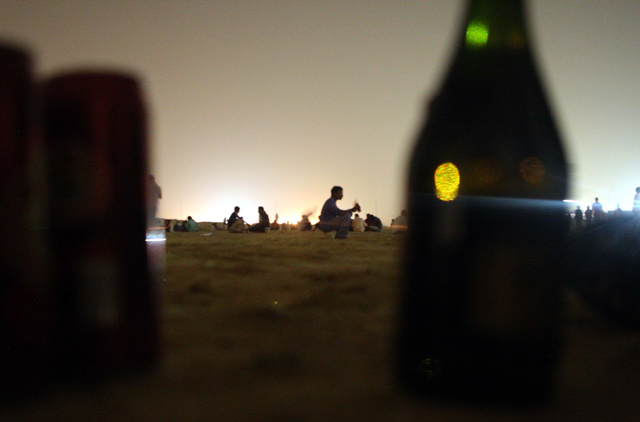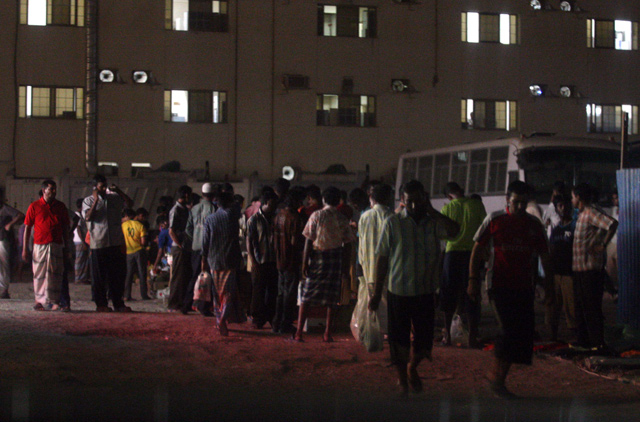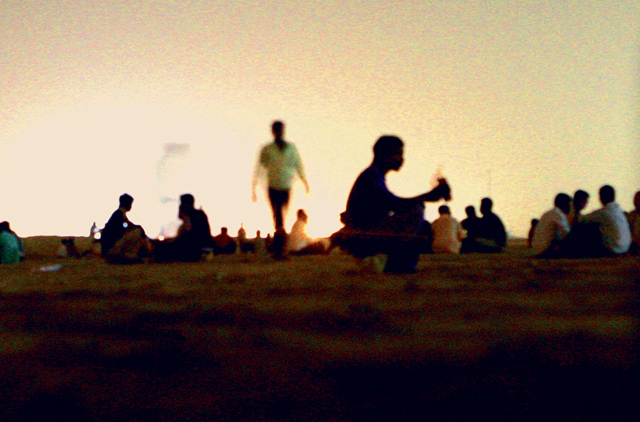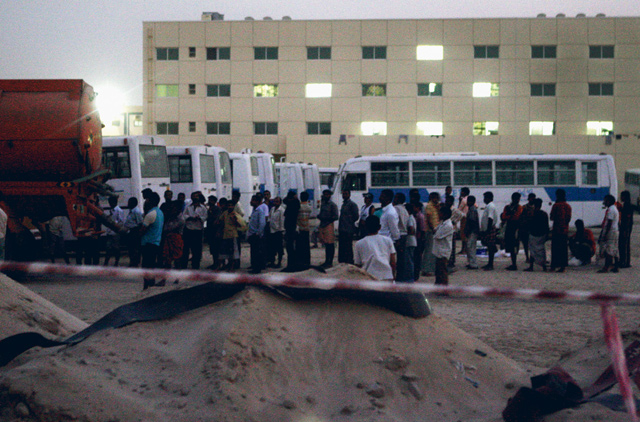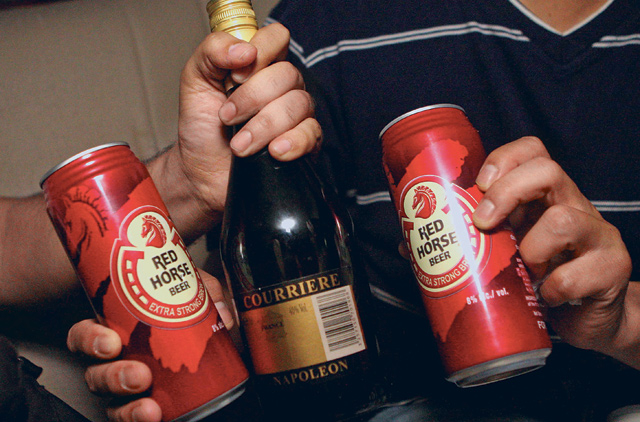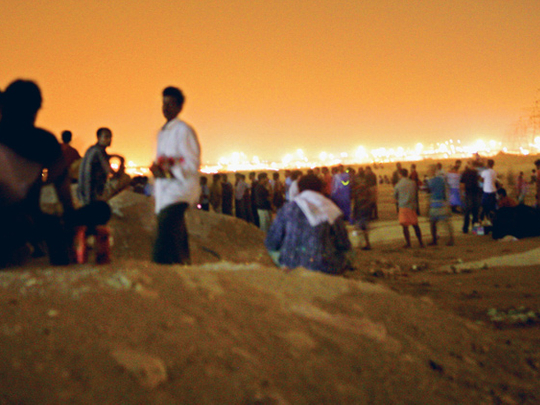
Dubai: "Yeh kapde nahi chalenge," (these clothes won't do) says our contact disapprovingly. He knows better. In our formal attire, we stick out like sore thumbs amidst the sea of Asian construction workers in soiled overalls trudging back to their camps in Jebel Ali Industrial Area, not far from the comfortable suburbs of Dubai.
It's a Tuesday evening, 7.15pm to be precise, and we are here to uncover what is arguably the country's biggest and most organised illicit alcohol sale racket. "You won't believe what you will see here," the man who tipped us off had said.
It's not an idle boast. As we drive around the narrow streets between the camps, we see scores of people queuing up at various spots to buy liquor — near the Labour Power Supermarket, behind a row of buses on a sandy patch and on a large expanse of land which the workers fondly call the ‘big ground'.
The spotters
From behind our car's tinted glasses, we also see the spotters — well-built men from the Indian state of Punjab, positioned strategically to keep surveillance and alert the gang if they find anything suspicious. A spotter watches our car restlessly. A worrisome expression creases his face as we slow down to observe the clandestine operation.
"The first queue is for beer, the second for whiskey," our contact explains as we speed past. "On weekends, the queues are so long they spill onto the streets. There are far more spotters on such days. Be careful if you want to come back," he cautions.
The warning is not lost on us. We are on dangerous terrain. Housing some of the biggest industries in Dubai, Jebel Ali is also home to over 1,50,000 expat labourers - prime targets for bootleggers and illegal alcohol traders. A staggering 374 crimes were reported from here last year. The dubious distinction ranks Jebel Ali among the most crime-prone areas of Dubai.
The gangs who run the bootlegging business here are ruthless mercenaries.
A savage sword battle with a rival gang left 30 people injured here in March 2008. "Anyone who crosses their path is assaulted," a police officer told the Dubai Court of First Instance in February last year. He was investigating the murder of two men who had posed a ‘threat to the business'. They were gang-raped and buried alive in the desert not far from where we stood.
It's not a nice feeling.
Yet we return at sundown on Thursday. This time we try to look the part. Wearing worn-out T-shirts and trackpants, we wait for our contact at the nearby Parco Supermarket - the labourer's nerve centre and also our rendezvous.
"Much better," he says, nodding approvingly at our dishevelled looks.
Just then a police patrol car shows up. Police crackdowns on bootleggers in Jebel Ali are routine. Last year, Jebel Ali police seized 148 tonnes of illegal alcohol from this area. This year's figure, though, is modest - 36 tonnes so far. "The spotters have wisened up," an intermediary would tell us later that evening.
Finding nothing amiss, the patrol car leaves. Twenty minutes later, the booze bazaar springs to life. It's a surreal spectacle.
Orderly queues
Orderly queues are beginning to form at all the three places we saw on Tuesday, only they are much bigger now - each with over 250 people by our conservative estimate.
Standing atop an overturned diesel canister near the Labour Power Supermarket, a young clean-shaven man wearing a Jack Daniel T-shirt and Reebok shoes addresses the milling crowd: "Patience, brothers, there's enough for all of you, stand in line, don't break the line. This one for is for beer, this for whiskey," he shouts, gesticulating.
Nearby, a young spotter keeps strict vigil. "Red car approaching, turning left... gone now," he says over a cellphone.
Fear is an indigestible ball in the stomach as we join a queue in the sandy patch behind a row of white labour buses. To overcome it, we strike a conversation with those ahead of us in the queue. "What if they run out of supplies?" one of us asks.
"Oh, don't worry, that's not going to happen. See those manholes, they have more stocked inside there. It takes them no more than five minutes to replenish the stock," a man who claimed to be a regular buyer tells us.
The queue inches forward slowly. As we wait for our turn, we notice that the illicit trade has also spawned a lucrative business of snacks to accompany the drinks. Omelettes, boiled eggs and salted peanuts sell as briskly as the liquor itself. "It supplements my income," says a Bangladeshi worker sitting on the ground with a small gas stove. In one corner dozens of people are huddled around an ironing board. We take a closer look. It's a gambling table.
Finally, our turn arrives.
We buy a bottle of French brandy and three cans of a poular Philippines' brand of beer. The brandy costs us Dh20 and the beer cans Dh5 apiece. The men who handed them to us from a huge black plastic garbage bag are Punjabis, not much older than some of the 17 Punjabi men convicted of bootlegging and who face the death sentence in Sharjah for killing a Pakistani man over a territorial dispute last year.
As we handed them the money, we cast a quick glance to our right. Stacked alongside the wall of an adjoining labour camp are at least 20 garbage bags bulging with hundreds of liquor bottles. We also see several crates of an Indian brand of whiskey. A man in a pair of faded denims and white vest is standing guard as he counts a huge wad of notes.
Could he be the ringleader?
Night has fallen on Dubai as we head to the big ground, a large swathe of dusty land the size of three football fields that can only be approached by foot. Here, as far as the eye can see, are hundreds of people consuming alcohol under the open skies. We squat beside a group of four. Photography is a risky proposition as spotters patrol the area. Yet our photographer manages to click a few pictures. To muffle the whirring noise made by the camera our team makes coughing and sneezing sounds. Labour buses block the access road to the sandy patch. Whether or not this is deliberate we don't know.
In the distance, we see the city's bright skyline. It's well past midnight. Dubai is asleep. But in this open-air bar, the party has just begun.
Liquor syndicate
The elaborate network of illegal alcohol import and distribution in the UAE is believed to be run by a cartel of Iranian, Baloch and Indian businessmen. Certain transport companies that run private taxi services, and buses for labourers handle alcohol movement from ports to distribution points in Sharjah and Dubai, according to a source. Unofficial estimates reckon illegal liquor worth over Dh35 million enter the UAE every year. Lieutenant Colonel Abdul Qadir Al Bannai, Director of Jebel Ali police station, said there are over 150,000 workers in the area and most of these who are involved in criminal acts are busted, adding that the remaining will be dealt with soon. A comment from Dubai Police Headquarters was not immediately available.
- 148 tonnes of illegal alcohol was seized from Jebel Ali last year


